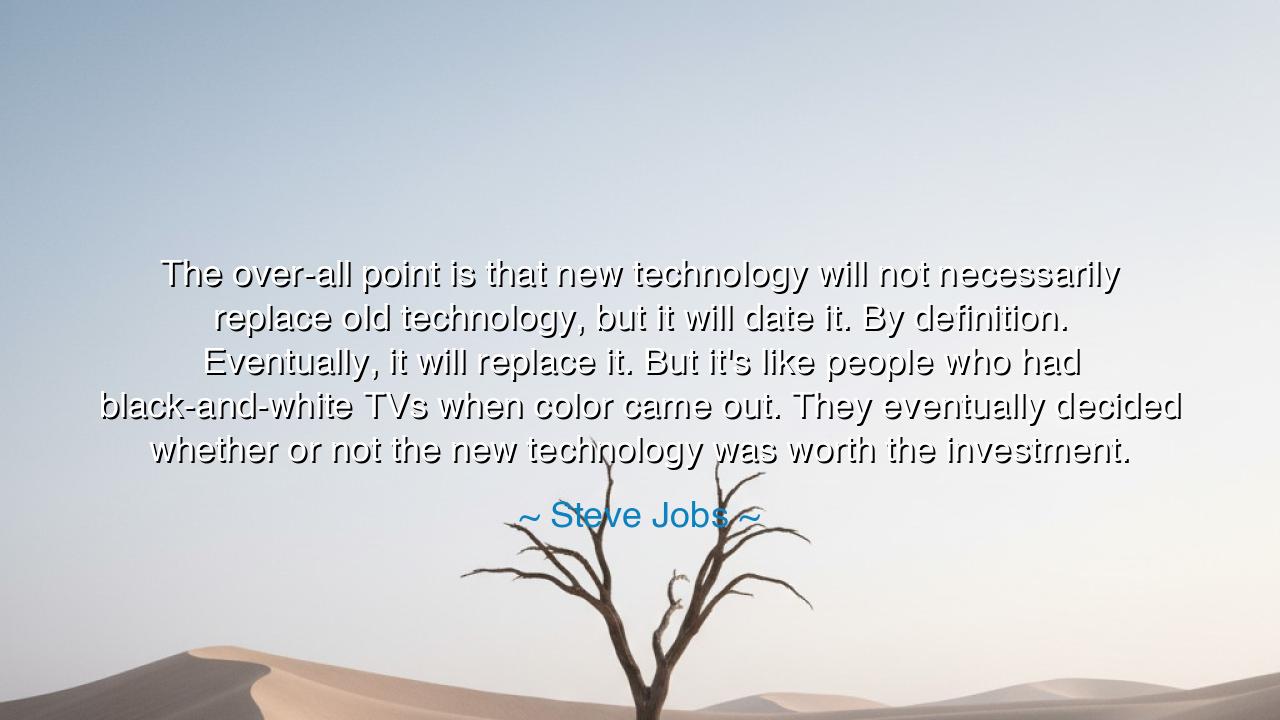
The over-all point is that new technology will not necessarily
The over-all point is that new technology will not necessarily replace old technology, but it will date it. By definition. Eventually, it will replace it. But it's like people who had black-and-white TVs when color came out. They eventually decided whether or not the new technology was worth the investment.






Steve Jobs, the master craftsman of the digital age, once declared with piercing clarity: “The over-all point is that new technology will not necessarily replace old technology, but it will date it. By definition. Eventually, it will replace it. But it's like people who had black-and-white TVs when color came out. They eventually decided whether or not the new technology was worth the investment.” These words are not merely the musings of an inventor, but the wisdom of one who understood the eternal rhythm of progress—the rise of the new, the fading of the old, and the choice each generation must make between clinging to comfort and stepping into the future.
When Jobs speaks of “new technology dating old technology,” he captures the truth that invention does not immediately slay what came before, but rather places it in shadow. Old tools linger, familiar and trusted, yet they begin to feel like relics as the world shifts around them. A black-and-white screen still works, but when color emerges, it feels like a window less alive. The quill may still write, but beside the printing press, it feels like a whisper against a storm. The new does not demand instant surrender, but it whispers to the heart that time is moving forward, and the choice cannot be delayed forever.
This truth has played out across history. When the automobile first appeared, many scoffed, clinging to their horses and carriages. Yet as roads expanded and engines improved, the old ways began to feel dated. For a time, horse and car coexisted, but slowly, inevitably, the horse yielded its role in daily life. Jobs reminds us that every new invention stands first as an invitation, then as a challenge, and finally as a replacement. The wise discern this rhythm and prepare, while the stubborn find themselves left behind by time’s tide.
Consider the story of the telegraph and the telephone. When the telephone was born, some said it would never rival the established telegraph, so trusted for decades. Yet as voice carried across wires, richer and faster than coded signals, the telegraph began to fade. At first, they coexisted. Soon, one was primary, the other secondary. Eventually, the telegraph became history. In this cycle, Jobs’ wisdom reveals itself: every invention carries within it the seed of transformation, and though it may not slay the old at once, it plants the tree that will one day overshadow it.
Jobs also speaks of choice. “They eventually decided whether or not the new technology was worth the investment.” This is the eternal test of human courage—the willingness to leave behind what is comfortable for what is possible. Each generation faces this moment: shall we cling to what we know, or shall we step into what might be? Those who cling too tightly to the old risk stagnation. Those who embrace the new blindly risk folly. But those who weigh with wisdom, and invest with foresight, shape the course of history.
The lesson for us, children of tomorrow, is to recognize this rhythm of change. Do not fear the new, nor despise the old, but understand that time itself is a current that flows toward renewal. When new technologies appear, ask not merely if they are dazzling, but whether they open doors to richer possibilities. And when the old begins to fade, do not weep for its passing, but honor it as the foundation upon which the new now stands.
Therefore, I counsel you: be vigilant, be discerning, be bold. Do not cling so tightly to the black-and-white screen that you cannot see the colors waiting to be revealed. Do not dismiss the new out of habit, nor embrace it out of vanity. Instead, let your choices be guided by vision—by the understanding that technology is not merely tools, but the unfolding of human destiny. If you meet the future with patience and courage, you will not only witness progress—you will be part of its creation.
So let Steve Jobs’ words resound like a bell of wisdom: “New technology will not necessarily replace the old at once, but eventually, it will.” This is the rhythm of invention, the dance of time. Embrace it with open eyes, for in that embrace lies not only survival, but greatness.






AAdministratorAdministrator
Welcome, honored guests. Please leave a comment, we will respond soon